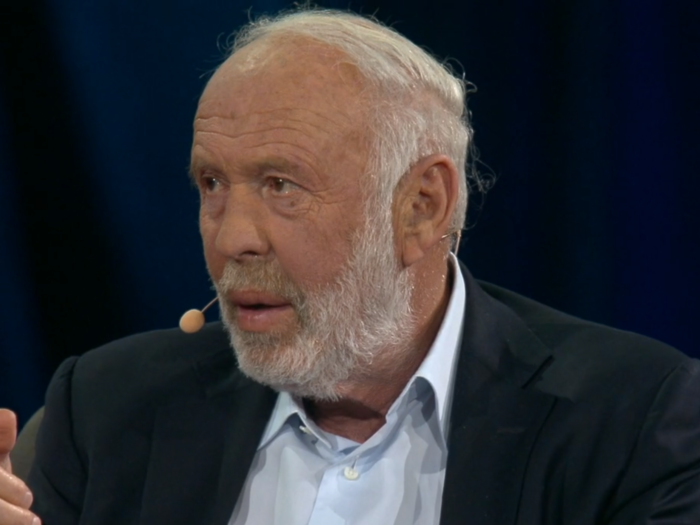- Home
- slideshows
- miscellaneous
- 'Pain + Reflection = Progress': Here are 13 brilliant quotes from hedge-fund legend Ray Dalio
'Pain + Reflection = Progress': Here are 13 brilliant quotes from hedge-fund legend Ray Dalio
"The main reason I write the daily observations is because I want to know where I'm wrong."

“I pay about a third in taxes, I give away about a third, and I follow the law.”
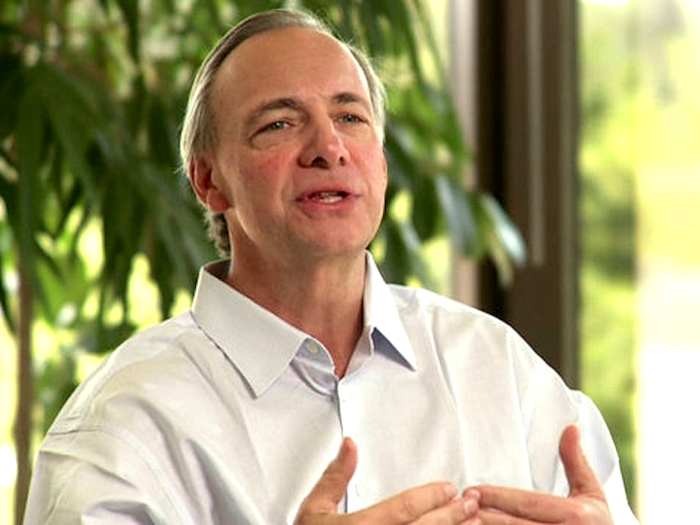
In 2011, Dalio appeared on Charlie Rose‘s program on PBS to talk about principles of his firm, Bridgewater.
“I think I did everything right,” he said. “I did well when others didn’t. I happen to earn one-fifth of the profits. I pay about a third in taxes, I give away about a third, and I follow the law. And if I’m doing something they think is incorrect, I’d like to know that.”
Source: Transcript
"He who lives by the crystal ball will eat shattered glass."

Speaking on a panel at the New York Times DealBook conference in 2012, Dalio warned that forecasting the timing of Federal Reserve's rising rates is probably a fool's errand.
"He who lives by the crystal ball will eat shattered glass," Dalio said.
Source: CNBC
"There are two main drivers of asset class returns — inflation and growth."
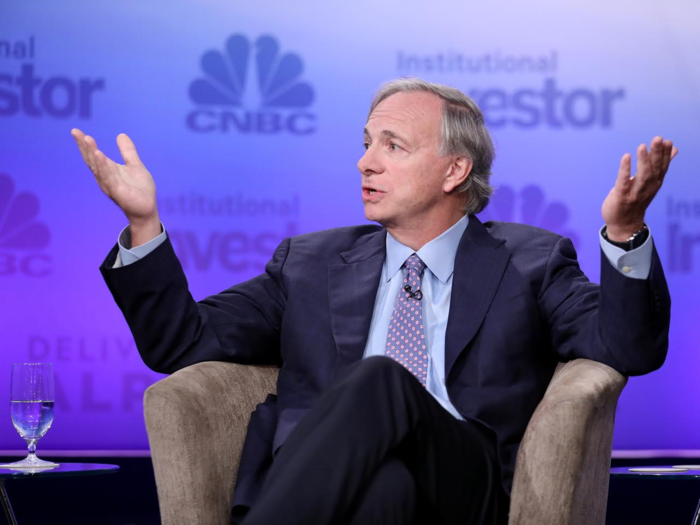
Dalio once sat down with CNBC's Maria Bartiromo in 2012 at the Council on Foreign Relations to give some advice for the average investor. At that time, he explained how inflation and growth affect the prices of asset class returns.
"There are two main drivers of asset class returns — inflation and growth," he said.
"When growth is slower-than-expected, stocks go down. When inflation is higher-than-expected, bonds go down. When inflation is lower-than-expected, bonds go up."
Source: Council on Foreign Relations
"Demand is best measured in terms of spending."

"Demand is best measured in terms of spending," Dalio said in 2012 at the Council on Foreign Relation. "You know, I think in traditional economics, it's a mistake to measure it in terms of the quantity of goods."
Source: Council on Foreign Relations
"Pull in your belt, spend less, and reduce debt"

In an interview with Barron's in 2012, Dalio noted that there are three types of deleveraging:
- Austerity: "Pull in your belt, spend less, and reduce debt"
- Debt restructuring: "Creditors get paid less or get paid over a longer time frame or at a lower interest rate"
- Printing of money: "Typically happens when interest rates are close to zero, because you can't lower interest rates any more"
He added that a beautiful deleveraging balances the three options.
Source: Barron's
"Almost everything is like a machine."

Unlike many hedge-fund managers who stay pinned to their computer screens day and night monitoring movements in the markets, Dalio spends most of his time trying to figure out how economic and financial events fit together in a coherent framework.
“Almost everything is like a machine,” he told The New Yorker in 2011. “Nature is a machine. The family is a machine. The life cycle is like a machine.”
He added: "And then everything else I basically view as just a case at hand. So how does the machine work that you have a financial crisis? How does deleveraging work — what is the nature of that machine? And what is human nature, and how do you raise a community of people to run a business?”
Source: The New Yorker
"I don't get caught up in the moment."

Talking at CNBC's Squawk Box morning show in 2012, Dalio said: "I don't get caught up in the moment."
"I think so many people are reactive ... they see things in a short term way when they're right up against it. If it didn't happen in your life before, then you're not paying attention, you don't think it's possible. But almost all important events never happen in your life before ... Monetary system break down ... the oil shock ... didn't happen before ...
"When I'm looking at it I think these things that kind of keep happening over and over again ... and then I have this template ... and these rules, if this happens then that's going to happen because it has all happened before."
Source: Transcript
"Pain + Reflection = Progress"
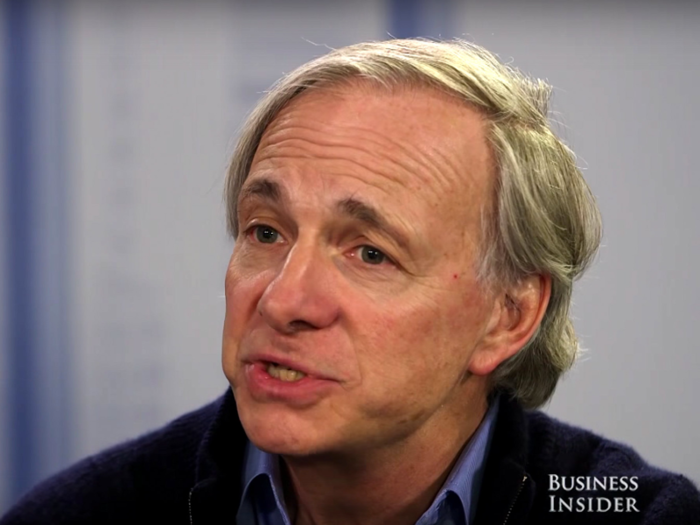
Dalio told Business Insider in May 2017 that he has a principle to success.
"Pain plus reflection equals progress," he said.
"Pain, when we're in the moment of pain, we tend not to reflect, but after that moment of pain, whenever anybody makes a mistake, about anything, it's not just the market, it's about life. There's a message probably there."
Source: Business Insider
The average man "tends to buy high and sell low."

In an interview with Business Insider CEO Henry Blodget in September 2017, Dalio said: "The average man tends to be much more reactive if you look at the purchases and sales that they make. When something goes up, they're more likely to buy it. They think, ah, that's a good investment. They don't know how to measure that in terms of, oh, is that a much more expensive investment that's more likely to go down?"
He added: "That's what they're attracted to. They tend to buy high and sell low, and so an average man should not be playing this game in that way ..."
Source: Business Insider
"In order to be successful, you're betting against the consensus, and you have to be right."

"In order to be successful, you're betting against the consensus, and you have to be right," Dalio said during the interview with Business Insider CEO Henry Blodget in September 2017.
He said: "The consensus is built into the price. So because the consensus is built into the price, and assets price themselves in a way that they're all competing, and they're all of equal value in a certain sense. There's risk premium of equities over cash and bonds will have that over whatever, but basically, they're all priced that way. So like think of it as going to betting on a sports team or in other words, or horse racing."
Source: Business Insider
“If you’re not failing, you’re not pushing your limits, and if you’re not pushing your limits, you’re not maximizing your potential.”
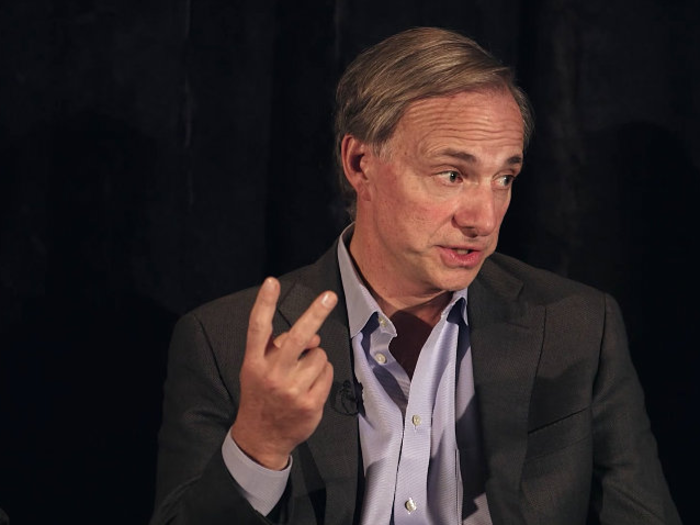
“The challenges you face will test and strengthen you," he wrote on Facebook in July 2018.
"If you’re not failing, you’re not pushing your limits, and if you’re not pushing your limits, you’re not maximizing your potential.”
Source: Ray Dalio's Facebook
"Listening to uninformed people is worse than having no answers at all."

"Find out who is responsible for whatever you are seeking to understand and then ask them," he wrote on his Facebook in October 2018.
"Listening to uninformed people is worse than having no answers at all."
Source: Ray Dalio's Facebook
Popular Right Now
Popular Keywords
Advertisement
